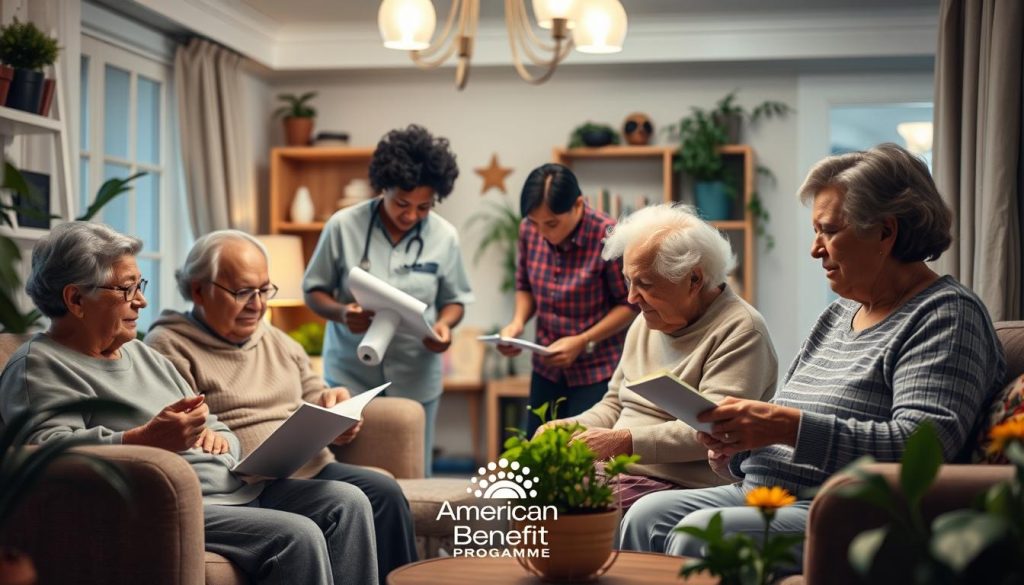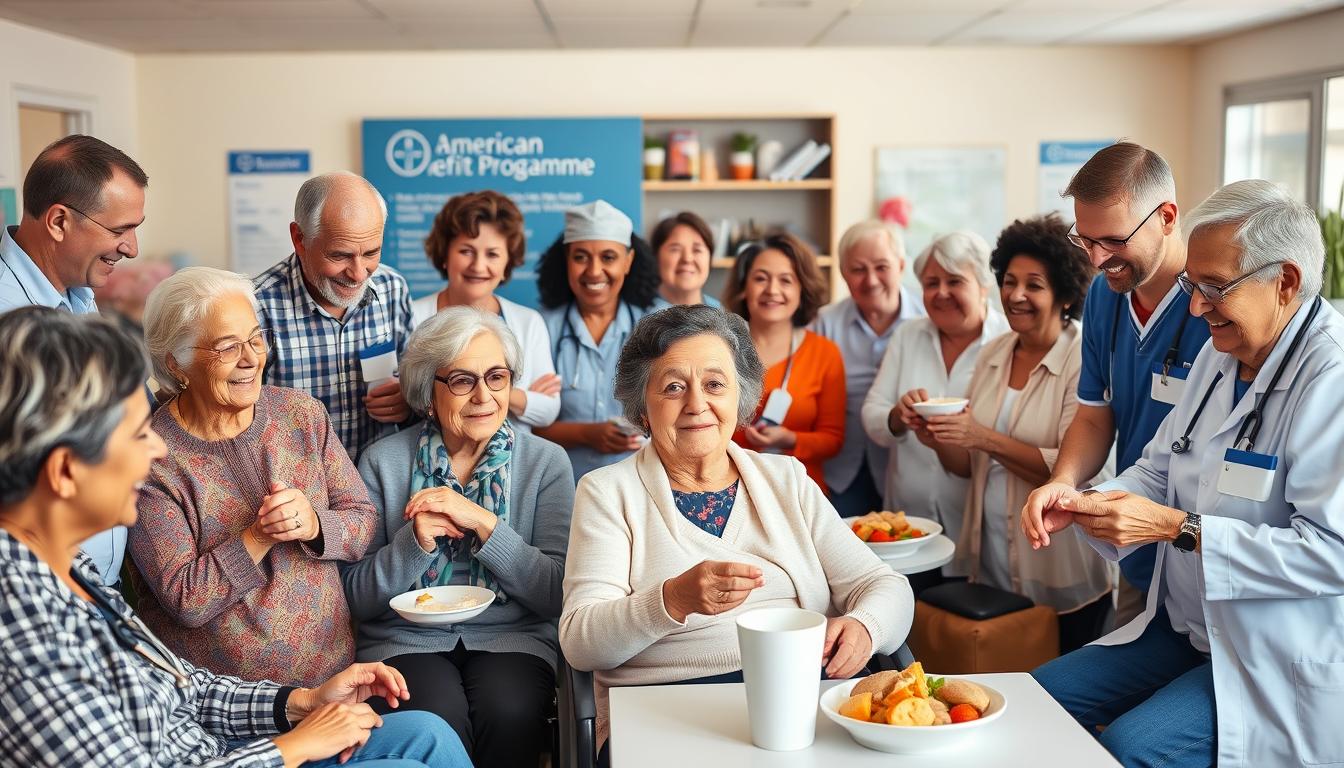Have you ever thought about making life better for older people? Soon, by 2050, nearly 82 million folks in the U.S. will be over 651. We need to focus on how to help them now. Options for senior care help with their needs. This lets them enjoy their later years with respect and happiness.
Options range from staying at home to getting help in special facilities. It’s key to know about all the ways to help older adults. This info helps seniors and their families choose the best care. We’re about to dig into staying at home, care services, and better life quality for seniors.
Home care lets seniors be more independent. Getting around can be hard for them2. So, a full plan for their care is very important. Let’s explore how to make senior care better in the U.S.
Key Takeaways
- The senior population is rapidly increasing, necessitating effective healthcare strategies.
- Home care services allow seniors to remain in the comfort of their homes.
- Personal care and healthcare can be tailored to fit individual senior needs.
- Transportation remains a significant issue for many older adults.
- Family involvement is crucial in making informed care decisions.
- Technological advancements are shaping the future of elderly care.
- Maintaining independence is a key goal for many seniors seeking care options.
Understanding Aging in Place
Aging in place lets seniors keep their independence by living in familiar places. It makes them happy and gives them control over their lives. Most seniors, nearly 90 percent, want to stay in their homes, AARP3 says. Knowing how to help them make this choice improves their life quality.
Definition and Importance of Aging in Place
Seniors staying in their homes as they age is what aging in place means. It keeps them comfortable and stable. Checking health like diabetes or heart conditions is key to see if they can live on their own4. Planning well and using resources are important to keep their freedom.
Services to Support Aging in Place
Many services help seniors stay at home. They cover health care, personal help, and more. Services can be short for recovery or long for constant aid4. Some common supports are:
- Personal care assistance
- Household chores
- Meal preparation
- Money management
- Healthcare assistance
- Transportation aid
- Home safety measures
Family and friends often provide these supports. Formal caregivers and community services help too4. Programs like Medicare and Medicaid help pay. Local aging agencies and community groups offer extra help4.
Types of Senior Care Services
Families looking after elderly loved ones need the right senior care services. Knowing the available options helps make good choices. Here are the main types of senior care, each meeting different needs.
In-Home Care
In-home care helps seniors get personalized help in their homes. This can make them feel more comfortable and safe. They might get help with driving, cleaning, and everyday tasks. It helps them stay independent but supported56.
Assisted Living Facilities
Assisted living helps seniors who need help with daily stuff but still want some freedom. They get help with personal care and can join in social activities. This creates a community feeling. These places often have great food and round-the-clock emergency help6.
Nursing Homes vs. Home Care
Nursing homes provide top care around the clock for those with serious medical needs. They are set up for tough health conditions and rehab. But, home care gives more personal help at home. Choosing depends on the care needed and what the senior prefers57.
Healthcare for Seniors: Navigating Medical Needs
As people get older, they have special health needs. They must look closely at chronic conditions like diabetes, dementia, and heart disease. This is key to keeping a high quality of life. They need to know their health requirements and how to move through the healthcare system.
Common Health Issues in Seniors
Older folks often face various health problems that need early care. Chronic illnesses are the main concern, needing ongoing attention. Conditions like heart disease can make it hard to move around. This can lead to poorer health if not taken care of. Talking well with doctors is crucial. Having someone trusted at doctor visits can help seniors understand their health better8.
Access to Geriatric Medical Care
Getting to see doctors who specialize in older adult health is very important. Medicare helps a lot by covering hospital stays and medicines. Knowing the difference between in-network and out-of-network doctors can change how much money seniors spend on health care9. It’s good for them to know about Medicare and how it works. Care managers can give advice on choices.
Some seniors might get help from both Medicare and Medicaid, giving them more coverage9. Senior centers can also help by talking about how to handle health care costs. This makes it easier for older adults to pay for their health needs8.
Home Care Services for Seniors
Home care services help seniors stay independent at home. They get the help they need to live well. Seniors can stay comfortable in their own homes with this help.
Personal Care Assistance
Seniors get help with things like bathing, dressing, and cooking meals. This help is very important. It lets them enjoy life and meet their needs better.
Healthcare Services at Home
Nurses and therapists visit seniors at home for care. They help with meds, treat wounds, and do therapy. Some get visits often or even 24/7 care10. This care is paid by the hour. Medicare may help but only for a little while10.
Importance of Companion Care
Companion care gives emotional support to seniors. It helps them feel less lonely or isolated11. Some volunteers visit seniors for free. This shows our care for the elderly. But, Medicare or Medicaid usually don’t pay for these visits12.

| Service Type | Description | Average Cost | Insurance Coverage |
|---|---|---|---|
| Personal Care Assistance | Assistance with daily activities | Varies by provider | Limited coverage by Medicare |
| Healthcare Services | Medical services provided at home | Billed hourly | Limited Medicare coverage available |
| Companion Care | Social interaction and emotional support | Varies by service | Not covered by Medicare or Medicaid |
Evaluating Senior Living Options
Finding the right place to live as a senior means thinking about your lifestyle and health. Independent living and retirement homes offer different perks for growing old gracefully.
Independent Living Communities
Independent living is great for older people who can take care of themselves. They get to live an active life with friends. They also have the freedom to make their home their own. Plus, there are lots of fun activities and things to do that keep them healthy. People should check their needs for daily help to choose the best place for them13. Being able to move around easily, especially with things like walkers, is key14.
Retirement Communities and Their Benefits
Retirement homes mix homey feels with health care. These places have everything from apartments to full-time nursing. This helps people as their health changes over time13. There are even fancy meal options that fit dietary needs14.
It’s important to look closely at communities to make sure they are safe and have the right licenses14. Knowing about yearly cost increases and extra fees is also important for planning your budget14.
| Type of Community | Level of Care | Key Benefits |
|---|---|---|
| Independent Living | Minimal | Active lifestyle, social engagement, personalized living. |
| Retirement Community | Varies | Continuum of care, various health amenities, dietary services. |
| Assisted Living | Moderate | Support with ADLs, social activities, and community services. |
| Skilled Nursing Facility | High | Intensive medical care, rehabilitation services, 24/7 oversight. |
Always ask about special deals and prices that can be talked down when looking at places. This careful checking helps find the best retirement home for seniors’ needs and likes13.
Promoting Senior Wellness Programs
Senior wellness programs are key to improving the health of older adults. They focus on the importance of staying active and eating well. This helps seniors live healthier lives. Being active improves strength, movement, and brain health.
Physical Activity and Exercise
Staying active is very good for seniors, making them healthy and strong. Sadly, less than 42% of those aged 65–74 exercise enough15. And even fewer work on building their strength. Exercise programs help seniors get moving more. This can make them feel better overall.
Nutrition and Healthy Eating
Eating right is vital for seniors for better health and keeping diseases away. But, only a few older adults eat enough fruits and veggies15. Senior wellness programs teach them about good nutrition. This helps them stay energetic and healthy.
Financial Planning for Elderly Care
Planning for elderly care can seem hard, but with the right steps, it gets easier. We’ll look at budgeting for home care and understanding Medicare. These are key for making good choices for elderly care.
Budgeting for Home Care Services
When it comes to budgeting for home care, it’s important to know how much money you need. Financial planners can guide families, ensuring they pick the best care. In Florida, there are nine Financial Planning Association chapters. They help families with planning for the elderly16. They offer advice tailored for seniors to manage money and choose the right care.
Understanding Health Insurance and Medicare Options
Seniors must understand their health insurance and Medicare choices. For example, Medicare covers many services, but not all senior living needs. Private pay or insurance might be needed17. Also, spouses of veterans may get up to $2,200 a month to help with costs17. As elder fraud increases, it’s essential to protect information while handling money17.
| State | Financial Planning Association Chapters |
|---|---|
| Alabama | 2 |
| California | 14 |
| Florida | 9 |
| Illinois | 3 |
| Michigan | 1 |
| Nevada | 3 |
| New York | 8 |
| Ohio | 5 |
| Pennsylvania | 3 |
| Texas | 6 |
A good budget and knowing Medicare options are key for stress-free elderly care. Finding a financial planner in your state can help make smart care choices. For more help, use resources from local planners like this helpful guide1617.
Family Support and Caregiver Resources
Bringing family into elder care choices helps seniors greatly. Loved ones coming together ensures choices fit the elderly’s needs. This makes for a happy, healthy life for seniors.
Involving Family in Care Decisions
Many voices make wise choices when caring for elders. Talking together helps find what each person wants. This teamwork makes families stronger and helps with caregiving stress. About 88 percent of caregivers feel help boosts their skills. This shows caring together matters a lot18.
Finding the Right Caregiver
Finding a caregiver means looking at their skills and how well they get along with the elderly. Families must look at experience, health knowledge, and if they’re around when needed19. Caregivers need support and advice too20. A strong support network is key for good caregiving.

Assessing the Aging Population Health Trends
The health of older people is very important as our society changes. We must understand these changes to meet the growing health needs of the elderly. Current facts show the main health problems they face.
Current Statistics on Senior Health
Most older adults have at least one chronic illness, making special healthcare very important21. Sixty percent live with two or more chronic conditions, raising their healthcare costs21. In 2020, the average older adult spent nearly $7,000 on medical bills22.
Many older people find medical documents hard to understand. This makes health decisions difficult22. About 1 in 4 older adults feel isolated, which harms their health22. More older people in all countries mean big challenges for healthcare worldwide23.
Future Projections for Elderly Healthcare Needs
The number of Americans over 65 will grow from 58 million in 2022 to 82 million by 205021. The group over 85 will triple. This shows we need more healthcare workers fast21.
Health systems face money worries because people live longer and there are more old people23. The way we provide healthcare will need to change soon23. Planning and new ideas are key to care for older people’s different health needs23.
Conclusion
Caring for seniors well means thinking ahead and giving them lots of support. It’s key to bring together elder care help, health programs made just for them, and good places for seniors to live. This mix helps seniors stay healthy and happy.
As people age, their healthcare needs get more complex. Families need to keep up with these changes. This includes understanding that what seniors want for their care can change. About 35% of seniors change their minds about treatments to keep them living longer24. Also, the oldest seniors are growing fast in numbers. This shows we need more studies and help for them25.
To make life better for our older loved ones, it’s smart to invest in wellness programs for seniors. Also, getting them the right help for their care is crucial. By talking more and focusing on staying healthy before problems start, families can make the aging journey happier and more colorful for their senior members.
Source Links
- Elderly Care Technology: 6 Trends Shaping Home Health in 2025
- Home Care Services and In-Home Assistance for Seniors
- The Value of Aging in Place
- Aging in Place: Growing Older at Home
- 8 Types of Senior Care & Living Options | Eden Senior Care
- The Differences Between All 8 of The Senior Care Options
- Different Types of Eldercare & Care Homes
- The Medical Minute: Simple steps to help seniors navigate their health care
- Navigating Healthcare: A Comprehensive Guide for Seniors – Total Life
- Services for Older Adults Living at Home
- Help In Your Home
- Senior Services
- Senior Living Options: What Retirement Housing Options are Best?
- How to evaluate a senior living community
- Aging Adults’ Preferences for Wellness Program Activities and Delivery Characteristics: A Cross-Sectional Survey
- Caring for Your Parents | Finances : Start Planning Now
- Financial Advice Every Senior Should Know
- National Family Caregiver Support Program
- Family Caregiving: Help and Support for Family Caregivers
- Caregiver resources
- Healthcare on the brink: navigating the challenges of an aging society in the United States – npj Aging
- Social Determinants of Health and Older Adults
- The Health of Aging Populations – Preparing for an Aging World
- Conclusion – Values of Older Adults Related to Primary and Secondary Prevention
- Conclusions and Recommendations – Changing Health Care Systems and Rheumatic Disease

Leave a Reply